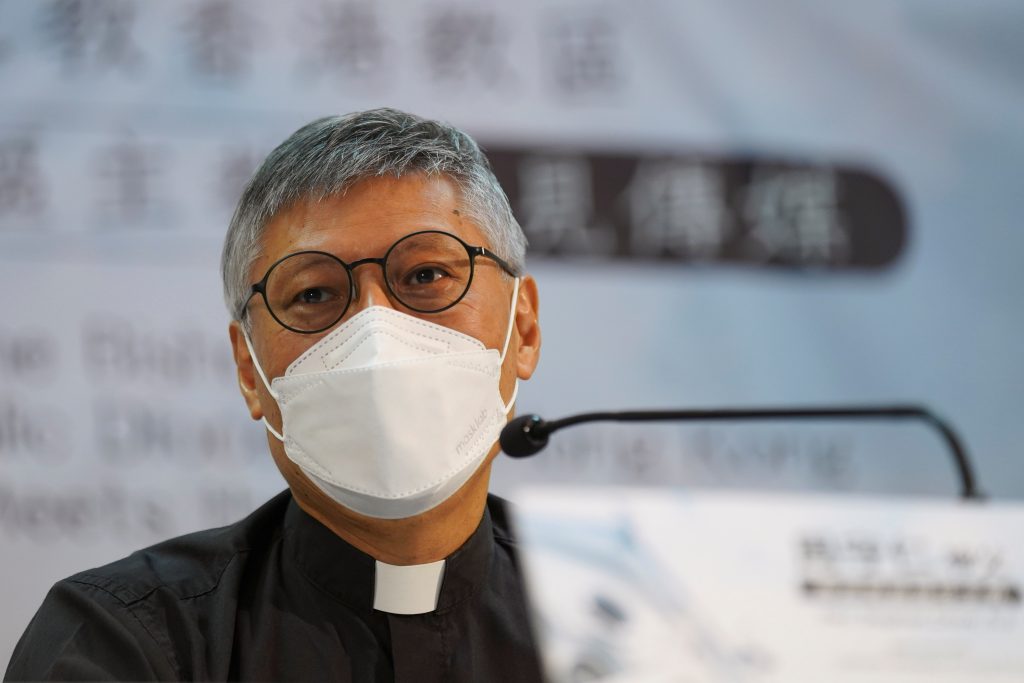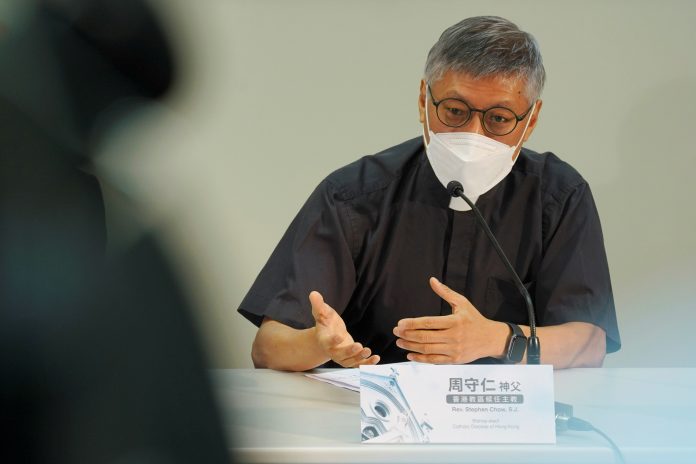The new Catholic bishop of Hong Kong said he believes that the way forward for the Catholic Church in China is “prudence” and “dialogue.”
“It is not because I am afraid, but, I think, I believe that prudence is also a virtue,” said Bishop-elect Stephen Chow in a media briefing on May 18, the day after the Vatican announced his appointment.
“For me, religious freedom is a basic right,” he said, adding that he wanted to remind the government “not to forget that.”
“It is important to allow religious freedom, matters of faith, not just (for) Catholics, but any religion should be free,” said the prelate.
He said it would be wrong to assume that Beijing is an enemy. “I believe that we must also start … with a sense of — we don’t assume they are enemies,” he said.
Bishop Chow said he is interested on “how can we, through our faith, have some dialogue … have some understanding together.”
“I do believe that there is a God who wants us to be united. Unity is not the same as uniformity,” he said, adding that he always emphasized in schools that “we must respect unity in plurality.”
The Jesuit priest has been supervisor of the Jesuit Wah Yan colleges in Hong Kong and Kowloon from 2006 to 2021.
He said “plurality” is “something that we must learn to respect.” He said “listening with empathy is very important” and is a “fundamental point.”
He revealed that he earlier turned down the proposal to be appointed as bishop, saying “the bishop of the diocese should better come from the diocesan priests.”
Bishop-elect Chow is the head of the Chinese province of the Society of Jesus.
“I didn’t feel the call in myself to be bishop,” he said.
He said he changed his mind when he received a handwritten letter from Pope Francis. “In the end, as Jesuits, we owe our obedience to the Holy Father,” said the priest.
“For me, that was a sign that I should take it up. And Hong Kong is a place I really love, my birthplace and the place where I grew up,” said the new bishop.

In the same media briefing, the prelate said he would pray for the victims of China’s 1989 crackdown on pro-democracy protesters, especially on occasions like observing the June 4 anniversary.
“Sometimes in the past, I had joined the event in the public arena, but there were times I could not go,” he said.
“So I pray, I pray for China, pray for all those who passed away in 1989. Whether it is possible this year depends on the legal requirements,” he added.
Bishop-elect Chow inherits a flock divided between those wanting the diocese to fight for Hong Kong’s waning freedoms amid an increasingly authoritarian grip by China, and others, including some powerful establishment figures, who want a less confrontational approach.
The Catholic church in Hong Kong has traditionally played an active role in the city’s commemorations of the Tiananmen crackdown. Such activities are banned in China, where the subject is extremely sensitive.
The former British colony traditionally held the largest vigils globally every year, having been promised certain freedoms when it returned to Chinese rule in 1997, including rights of expression and assembly.
Last year was the first in which the vigil was banned in the global financial hub, with police citing coronavirus restrictions on group gatherings. This year’s protest is expected to face a similar fate.
Still, tens of thousands of people lit candles across the city in what was largely a peaceful event last June, bar a brief skirmish with riot police in one neighborhood.
Last year’s anniversary struck an especially sensitive nerve, just as Beijing prepared to introduce a sweeping national security law, criminalizing anything China sees as subversion, secession, terrorism or collusion with foreign forces.
This year, the event is particularly awkward for Beijing, which celebrates the 100th anniversary of the Communist Party on July 1.
Bishop-elect Chow said the city, a strong Catholic beachhead on the edge of a mainland China under officially atheist Communist Party rule, could attempt to heal its divisions through dialogue. – with a report from Reuters









